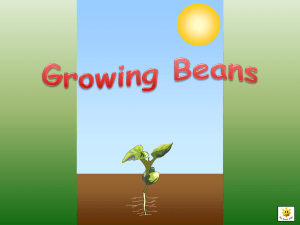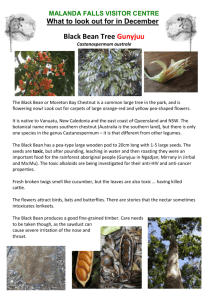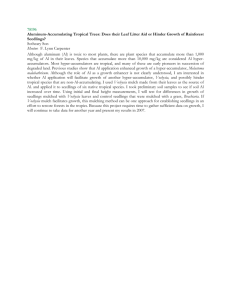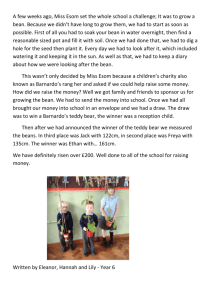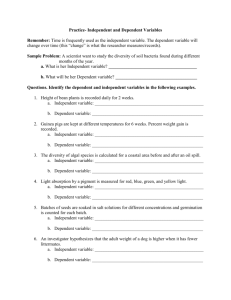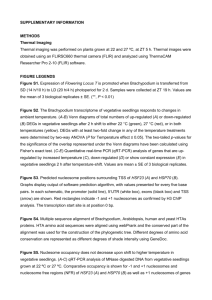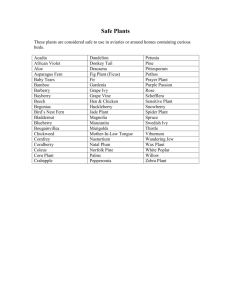File
advertisement
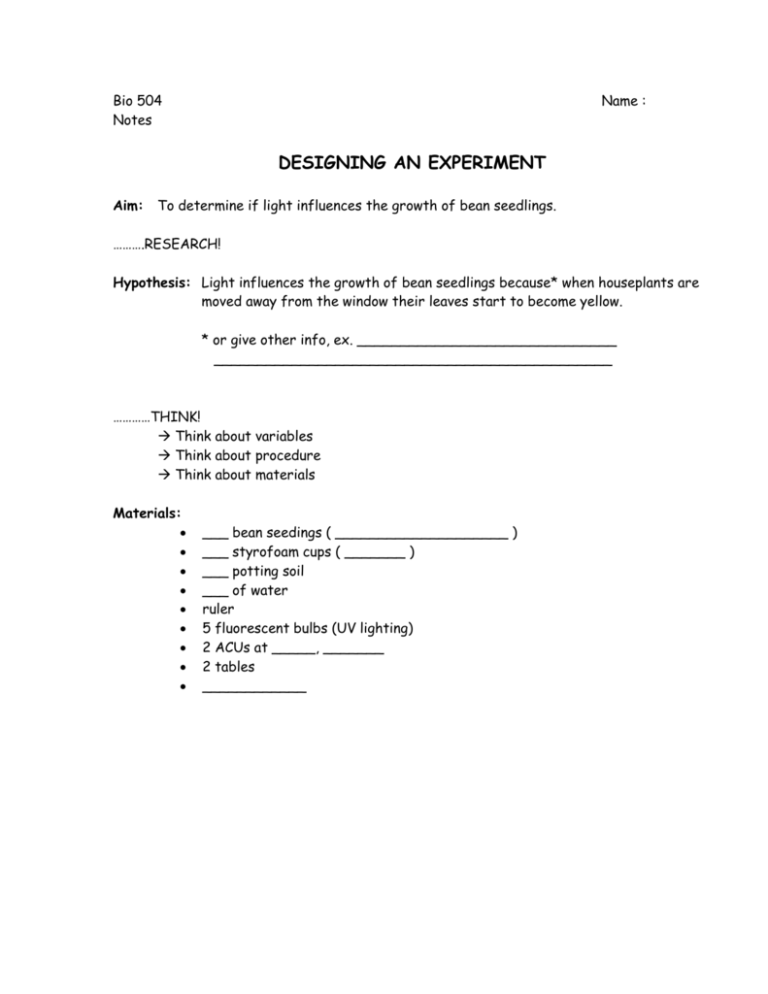
Bio 504 Notes Name : DESIGNING AN EXPERIMENT Aim: To determine if light influences the growth of bean seedlings. ……….RESEARCH! Hypothesis: Light influences the growth of bean seedlings because* when houseplants are moved away from the window their leaves start to become yellow. * or give other info, ex. ______________________________ ______________________________________________ …………THINK! Think about variables Think about procedure Think about materials Materials: ___ bean seedings ( ____________________ ) ___ styrofoam cups ( _______ ) ___ potting soil ___ of water ruler 5 fluorescent bulbs (UV lighting) 2 ACUs at _____, _______ 2 tables ____________ Procedure A) Variables 1- experimental variable: _____________________ 2- control variables: _______________ _______________ _______________ _______________ _______________ B) Steps 1. Make a hole in the end of each Styrofoam cup with the end of a pencil. 2. Fill each cup with 100ml of soil. 3. Place a bean seed in the centre of each cup at a depth of 4cm. 4. Place 20 cups in an ACU containing the fluorescent bulbs. 5. Turn on fluorescent bulbs 24h/day. 6. Place 20 cups in an ACU without lighting. 7. Water each seed with 3ml of water every day for 3 weeks. 8. Record observations every day for 3 weeks. (***measurement vs subjective) Results: * Raw data * Compiled data (averages) *Graph 1- Growth of bean seedlings Growth of Bean seedlings 160 140 average height (cm) 120 100 no light light 80 60 40 20 0 1 2 3 4 5 6 7 8 9 10 11 12 time (days) 13 14 15 16 17 18 19 20 21 *Graph 1- Growth of bean seedlings Growth of Bean Seedlings 45 40 35 average height (cm) 30 25 20 15 10 5 0 1 2 conditions *Table 1-Growth of Bean seedlings conditions observations Day 4 Day 5 Day 1 Day 2 Day 3 No light No growth No growth No growth No growth Light No growth No growth Sprouted Dark green Sprouts brighter REMEMBER! Measurement! Starts to sprout Leaves start to appear Day 6 Day 7 Day 8 Sprout looks similar Leaves bright green Sprout light green More than 5 leaves on plants Sprout yellowish, no leaves Plants look very healthy, bright green Conclusion: The aim was to determine if light would affect the growth of bean seedlings. The hypothesis was that light does affect how beans will grow because house plants that are placed away from a window are not as green as those grown in well lit areas. The experiment shows that bean seedlings grown in lighted conditions are more healthy. On average, beans grown in 24h a day of UV light will grow to be 40cm tall whereas those grown without light were less than half this height. Bean seedlings in lighted conditions were much brighter green and had an average 10 more leaves per plant than those grown in the dark ….. The chlorophyll present in plants allows the plants to produce sugars for growth. In plants grown without light, the chlorophyll production is low. As a result, the plants do not grow as well. The experimental method was well organised. The variables were well controlled. The plants were watered daily and precise measurements were made at regular intervals. A string was used to measure the seedlings. The stems were bent and this allowed for more accurate readings. The results would be more reliable if more samples had been used. It would have been interesting to determine how the beans grew under various light conditions (ex. 12h dark/light) to more accurately depict what happens in nature. Bio 504 Notes Name : DESIGNING AN EXPERIMENT Aim: To determine if light influences the growth of bean seedlings. ……….RESEARCH! Hypothesis: Light influences the growth of bean seedlings because* when houseplants are moved away from the window their leaves start to become yellow. * or give other info, ex. ______________________________ ______________________________ …………THINK! Think about variables Think about procedure Think about materials Materials: ___ bean seedings ( ____________________ ) ___ styrofoam cups ( _______ ) ___ potting soil ___ of water ruler 5 fluorescent bulbs (UV lighting) 2 ACUs at _____, _______ 2 tables ____________ Procedure A) Variables 1-experimental variable: _____________________ 2-control variables: _______________ _______________ _______________ _______________ _______________ B) Steps 1. Make a hole in the end of each styrofoam cup with the end of a pencil. 2. Fill each cup with 100ml of soil. 3. Place a bean seed in the centre of each cup at a depth of 4cm. 4. Place 20 cups in an ACU containing the fluorescent bulbs. 5. Turn on fluorescent bulbs 24h/day. 6. Place 20 cups in an ACU without lighting. 7. Water each seed with 3ml of water every day for 3 weeks. 8. Record observations every day for 3 weeks. (***measurement vs subjective) Results: * Raw data * Compiled data (averages) *Graph 1- Growth of bean seedlings Growth of Bean seedlings 160 140 average height (cm) 120 100 no light light 80 60 40 20 0 1 2 3 4 5 6 7 8 9 10 11 12 time (days) 13 14 15 16 17 18 19 20 21 *Table 1- Growth of bean seedlings Growth of Bean Seedlings 45 40 35 average height (cm) 30 25 20 15 10 5 0 1 2 conditions *Table 1-Growth of Bean seedlings conditions No light Light Day 1 Day 2 No No growth growth Day 3 No growth No No growth growth Sprouted Dark green REMEMBER! Measurement! observations Day 4 Day 5 No Starts growth to sprout Sprouts Leaves brighter start to appear Day 6 Sprout looks similar Leaves bright green Day 7 Sprout light green More than 5 leaves on plants Day 8 Sprout yellowish, no leaves Plants look very healthy, bright green Conclusion: The aim was to determine if light would affect the growth of bean seedlings. The hypothesis was that light does affect how beans will grow because house plants that are placed away from a window are not as green as those grown in well lit areas. The experiment shows that bean seedlings grown in lighted conditions are more healthy. On average, beans grown in 24h a day of UV light will grow to be 40cm tall whereas those grown without light were less than half this height. Bean seedlings in lighted conditions were much brighter green and had an average 10 more leaves per plant than those grown in the dark . … The chlorophyll present in plants allows the plants to produce sugars for growth. In plants grown without light, the chlorophyll production is low. As a result, the plants do not grow as well. The experimental method was well organised. The variables were well controlled. The plants were watered daily and precise measurements were made at regular intervals. A string was used to measure the seedlings. The stems were bent and this allowed for more accurate readings. … The results would be more reliable if more samples had been used. It would have been interesting to determine how the beans grew under various light conditions (ex. 12h dark/light) to more accurately depict what happens in nature. …
